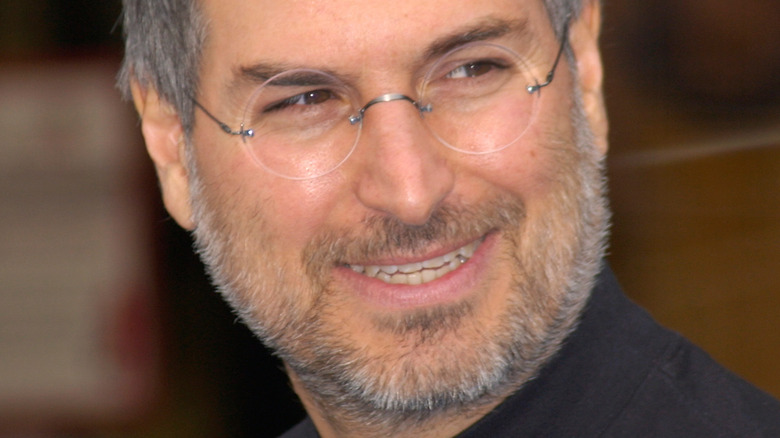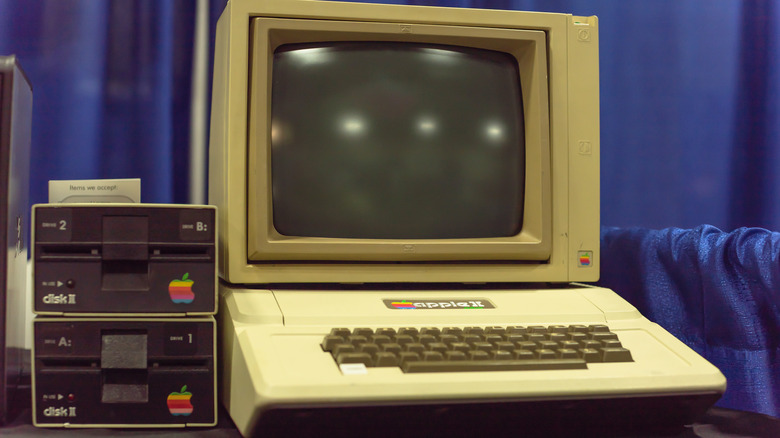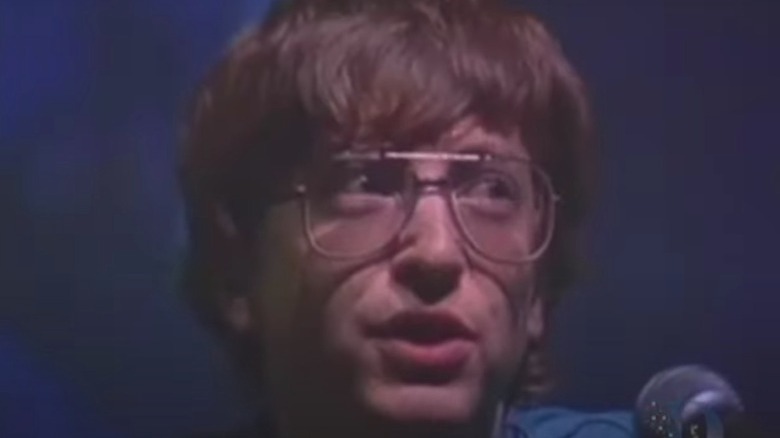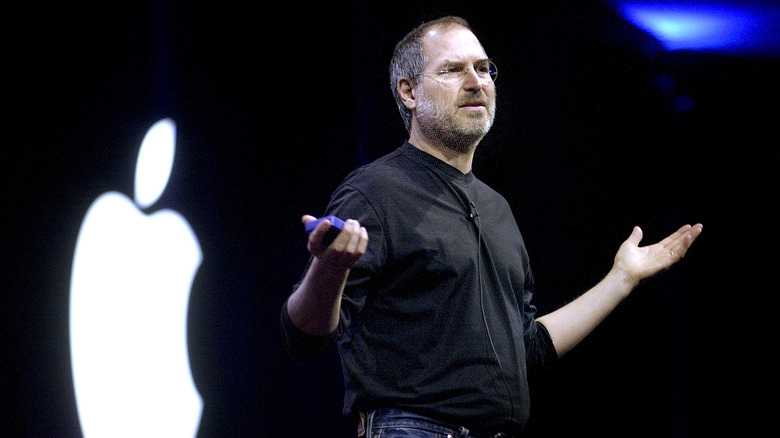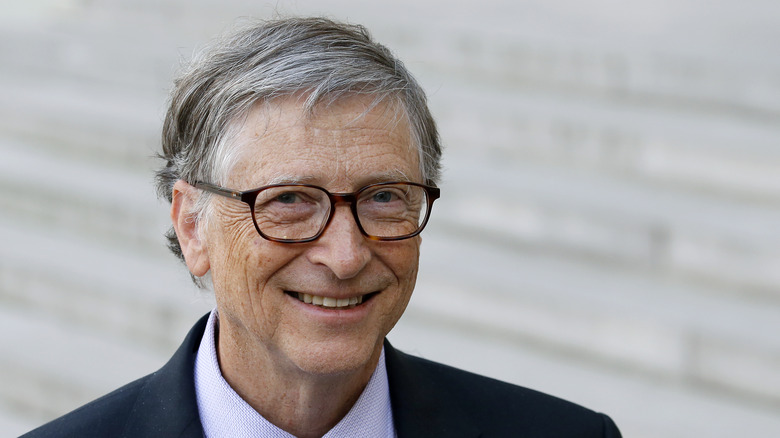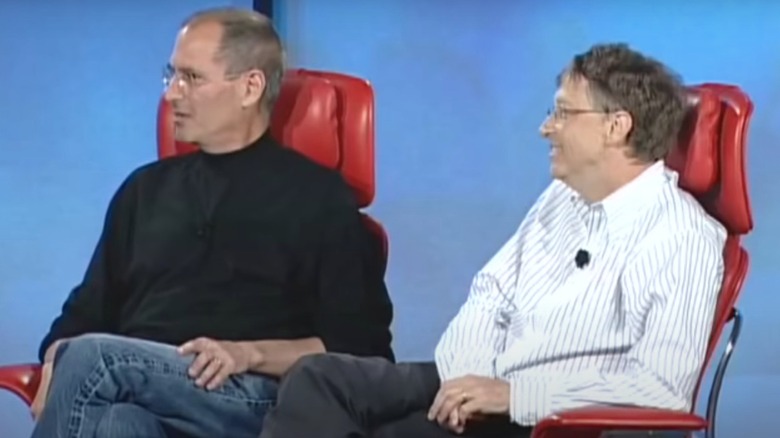Steve Jobs' Relationship With Bill Gates Explained
It was pretty much destined to be a roller coaster ride of a relationship. Apple frontman Steve Jobs and Microsoft founder Bill Gates were at times collaborators, at times competitors, at one moment friends, only to turn into trash talking enemies the next. During one rather lovey-dovey point in their love-hate relationship that spanned decades, they even had what could only be described as quite possibly the nerdiest bromance in history.
The two were arguably some of the most influential people at the turn of the 21st century. In his critically acclaimed 2011 biography of Steve Jobs, Walter Isaacson compared the computer magnates to other influential pairs from history, such as physicists Albert Einstein and Niels Bohr, or American statesmen Thomas Jefferson and Alexander Hamilton. He wrote that "despite their similar ambitions at the confluence of technology and business, [they] had very different personalities and backgrounds." Those similarities brought them into constant contact on their parallel missions to revolutionize how we use technology to both work and play, and those differences made sure sparks flew when their egos clashed. However, in the end, the techy frenemies fostered a relationship of respect that bordered on unmistakable envy. Let's take a look into the relationship between Steve Jobs and Bill Gates over the years — its ups, its downs, its vitriol, and its virtues.
Steve Jobs and Bill Gates actually collaborated on projects, at first
Although you wouldn't guess it from some of their more scathing remarks about each other later in their careers, Jobs and Gates actually started off as business partners. This was, of course, back in the days when computers came in big, bulky boxes that took up half the desktop they were named after. According to Business Insider, some of the software on the Apple II PC was made by Microsoft. Bill used to make regular visits to the Apple facilities in Cupertino, California, to check out what Steve and his company were up to.
But the seeds of their rivalry were already starting to sprout in this early stage of their relationship. Gates remembered not being too impressed by what he saw of the Macintosh operating system. He called one of his trips to California "a weird seduction visit" in which Jobs made it clear that he didn't actually need Gates. "He's in his Steve Jobs sales mode," said Gates, "but kind of the sales mode that also says, 'I don't need you, but I might let you be involved.'"
However, one Apple engineer named Andy Hertzfeld recalled that Gates didn't seem too eager to be impressed. "You could tell Bill Gates was not a very good listener," Hertzfeld told Isaacson for his biography of Jobs. Gates apparently preferred to guess how things worked, rather than be told how. But the pair's relationship was still pretty amicable at this point.
Bill Gates was a contestant on the Macintosh Software Dating Game
In 1983, Steve and Bill's relationship was still a bit fun and friendly. They hadn't yet entrenched themselves into all-out computer company warfare. In fact, they enjoyed what might be called a techie bromance, as evinced by Gates' participation in an Apple event in 1983 that featured him as a contestant in the Macintosh Software Dating Game. At the helm of the mock game show, Jobs acted as both host and guest looking for love, or rather, a software CEO who could help Apple make the new Macintosh PC a success.
In a video of the game posted to YouTube, Jobs can be seen jokingly asking "software magnate number three" geekishly playful questions like, "When was your first date with Macintosh?" Gates fawns over Apple's new computer when Jobs asks him if the Macintosh PC will be the "third industry standard" after the IBM PC and the Apple II. Gates says that the Macintosh is the only computer he's seen that is "really new and really captures people's imagination," a response that sends the crowd cheering and puts a huge smile on Jobs' face.
The game ends amicably, with Jobs saying he needs all of the CEOs in order to make the Macintosh a success. They all smile and laugh at the fun they just had. However, for Jobs and Gates, the honeymoon wouldn't last forever.
Their bromance fell apart with the advent of Windows
So the two magnates got to work on the Macintosh and turned it into a complete success. In fact, as Yahoo! News notes, Gates claimed in an interview decades later that he had more people working on the computer than Apple did. During their collaboration, Jobs had gotten Gates to promise that he wouldn't design a graphical interface (icons, windows, and all the other stuff we know as operating systems today) for any other company besides Apple for at least a year after the release of the Macintosh. But, unfortunately for Jobs, things don't always go as planned.
According to Isaacson's biography, Jobs' computer rollout was delayed by a year, and Gates was not going to wait any longer. He announced in November 1983 that Microsoft was going to develop a graphical interface operating system with IBM, enraging Jobs. He accused Gates of stealing the idea from Apple, but Gates said there was another way of looking at it. He claimed that Apple actually got the idea for a graphical interface from fellow tech company Xerox, so the idea was never Apple's to steal. "I think it's more like we both had this rich neighbor named Xerox," Gates told him, "and I broke into his house to steal the TV set and found out that you had already stolen it."
Jobs thought Gates was a square, Gates said Jobs couldn't even code
After the announcement of Windows, the dating game was over. The competition was on. "Each one thought he was smarter than the other one," Hertzfeld is quoted in Isaacson's biography. He said that Jobs derided Gates' sense of style, while Gates criticized Jobs for being a computer magnate who didn't even know how to write code. While Gates recognized and somewhat envied Jobs' charisma and ability to influence people, he also saw his competitor as "fundamentally odd" and called him "weirdly flawed as a human being."
Jobs, on the other hand, thought Gates was tragically unhip and narrow-minded. He thought that his competitor's consciousness could have used some expanding. "He'd be a broader guy if he had dropped acid once or gone off to an ashram when he was younger," Jobs once said of him. Isaacson noted that these differences ended up making them polar opposites in the digital age. While Jobs focused on style, design, and the artistry of Apple products, Gates was a pragmatist who spent more time and effort on the functionality of Microsoft's software. And they were pretty much at odds for the rest of their relationship until Jobs' death from pancreatic cancer in 2011.
Ultimately, Jobs and Gates respected each other, kind of
In the end, the two computer tycoons had a sort of begrudging respect for each other. Isaacson noted how Gates admired Jobs' "amazing instinct for what works," despite the fact that he "really never knew much about technology." In fact, there may have been a bit of jealousy on Gates' part — the nerdier of the two envying the cooler one (must have been Jobs' uniform). "I'd give a lot to have Steve's taste," he once said in a tandem interview, according to the Wall Street Journal.
It can be difficult to find similar feelings reciprocated by Jobs. Isaacson quoted him as calling Gates an "unimaginative" businessman who "never invented anything." Jobs seemed to never be able to get over the perceived theft of his idea in the form of Windows. "He just shamelessly ripped off other people's ideas," he said of Gates.
But despite hating on Gates' lack of style, Jobs did have to acknowledge his business acumen. He was the richest man in the world, after all. So in the end, he had to give Gates some respect for what he'd achieved. "I admire him for the company he built — it's impressive — and I enjoyed working with him," he said, according to Isaacson. "He's bright and has a good sense of humor." And as Yahoo! News pointed out, Gates showed no hard feelings for the things Jobs said about him. "We spurred each other on, even as competitors," he said. "None of that bothers me at all."
